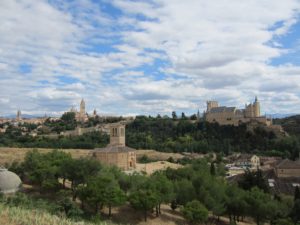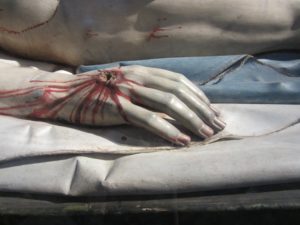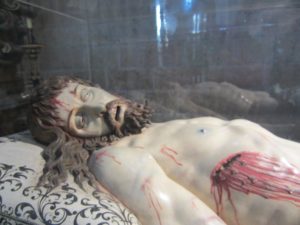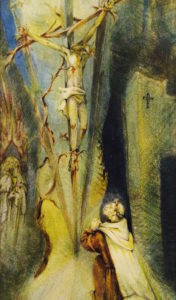
On December 14, 1591, at the age of 49, Saint John of the Cross passed to Heaven and joined with the choirs of angels to sing the mercies of the Lord.
In the months before his death, Saint John headed for the monastery of La Peñuela, which belonged to the Province of Andalucia. It was a simple community. He arrived in August and during this time, the community worked in the fields tilling chick peas (garbanzo beans). John spent many hours in his cell, likely using his time to revise The Living Flame of Love, or making copies of The Spiritual Canticle.
After about a month in La Peñuela, he began to experience small episodes of fever. As the fever intensified, the superior thought it best to take him to the monastery in Ubeda, where he could be placed under the care of a doctor. St. John himself thought that his stay in Ubeda would be short and that he would be back in La Peñuela, to his assigned monastery.
He arrived in Ubeda on the evening of September 28, 1591. The community was small, simple, and deprived of many commodities. The attending doctor, Amobrosio de Villarreal, diagnosed St. John of the Cross as having a cellulitis infection diffused in his right leg. The illness caused him extreme pain. The pain intensified as the infection spread from his leg to the foot, but the Saint patiently dealt with this excruciating pain with serenity.
The doctor treated the infection by performing surgery and cauterization to prevent further infections, procedures that only added to the anguish and pain, to say the least. Yet the doctor attested to the peacefulness in which John bore his medical treatment. Saint John did not have rest from his pain, except for a small cord that hung from the ceiling to his bed; he would clutch it with his hands to distract himself from the pain in order to speak to visitors.
The treatment, needless to say, did not work. The early weeks of December were for John, days to prepare for death. In the last hours of his life, eyewitnesses recount how St. John of the Cross directed his gaze of faith on the Love of the Lord. The friars gathered in his cell and recited the prayers of dying, in which John devotedly responded. At about midnight on the clock church, Brother Francisco Garcia, the bell toller, came out of John’s cell to toll the bell for Matins. As he finished ringing the bell, St. John gave his last breath on earth.
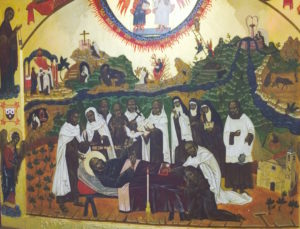
It is said that in his final hours, Our Holy Father St. John of the Cross asked for three graces which the Lord granted: 1) the grace to die where nobody knew of him so that neither in life, nor in death should anyone honor him. This was the grace to be small and unnoticed. 2) He asked that he would die without ecclesiastical honors (such as a prelate or superior) in order to exercise humility. 3) Finally, he asked that the Lord grant him a purgatory while on earth.
A friend of St. John of the Cross, Ana del Mercado Y Penyalosa, obtained from the Provincial, Nicolas Doria, permission to bring the body from Ubeda to Segovia. Nine months after the Saint’s death, Ana and her brother enacted the transfer. Almost two years later, the coffin was opened, only to find St. John incorrupt.
The body finally arrived in Segovia on May 1593 for its final resting place in a niche on the wall near the altar of the Blessed Virgin Mary. The remains of the Saint continued to call pilgrims from all parts of Spain, as they were experiencing healings and various miracles. Around the body, witnesses recalled smelling sweet fragrance. After the death of the Provincial Nicolas Doria, the new provincial moved the remains out of the wall and placed it in a large urn in the shape of sarcophagus in the center nave for the proper veneration of all.
Pope John Paul II, who wrote his doctoral thesis on St. John of the Cross, visited his body in Segovia on November 4, 1982. In 1993, he named Saint John of the Cross patron of all Poets.
Saint John of the Cross, pray for us.
(SOURCE: Homily, Solemnity of Saint John of the Cross, 12/14/2016. San Jose, CA)
Copyright 2016, Fr. Jose Luis Ferroni. All Rights Reserved

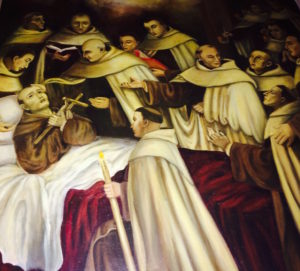

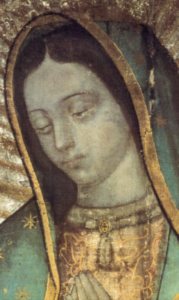 December 12, Feast of Our Lady of Guadalupe
December 12, Feast of Our Lady of Guadalupe 